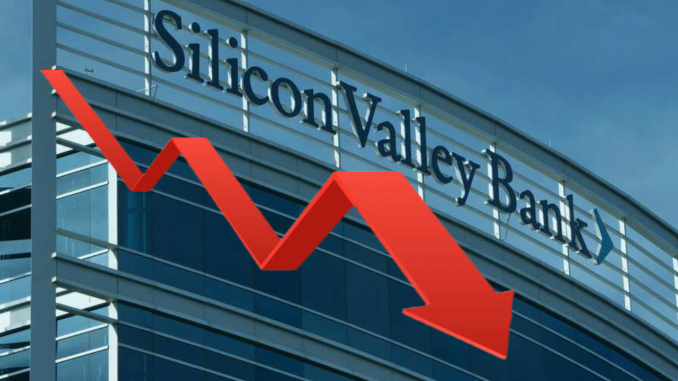
Last week, Silicon Valley Bank (SVB), a small bank focused on investing in tech companies, suddenly collapsed, sending shockwaves through the financial markets. The collapse raises fears that another, bigger collapse is coming, something like what happened in 2008. While this doesn’t seem immediately likely, anything is possible. The capitalist system today is very unstable, especially after the disruptions caused by the Covid pandemic, so that a crack in one part of the system might spread and a small crisis could become a major one. Of course, the world’s governments are working overtime to save their real constituents – the wealthy elite. While disaster, war, disease, and climate change throw the lives of millions into crisis everyday, governments do nothing. When the banks have a problem? The governments rush in to help them out.
From Boom to Bust
Silicon Valley Bank was a victim of its own, rapid success in recent years. The bank was in business for only 40 years, and developed alongside Silicon Valley’s tech industry. It was a small bank which specialized in serving tech companies, and was very successful doing so. However, when the Covid pandemic hit, tech companies suddenly started to see their profits skyrocket. Humanity, especially the part of humanity with spending money, was stuck at home, working online, and living online. Tech companies made mega-profits and Silicon Valley Bank was perfectly positioned to take advantage. The bank received deposits of over $100 billion dollars. The bank’s revenue went from $50 billion in 2019 to $200 billion in 2021.
Then Silicon Valley Bank began to gamble with that money, investing heavily in long-term government bonds. These long-term loans pay off over a decade or more, and in normal times, are considered an investment with only moderate risks. But then, inflation hit the global economy. The Federal Reserve raised interest rates to try to cool the economy. The result? Old government bonds, which pay off at the lower interest rates at which they were originally set, are worth less than current ones. At one blow, the government devalued old bonds, and undercut Silicon Valley Bank’s investment. What’s worse, Silicon Valley Bank was relying on government bonds while also gambling in other high-risk investments. They had a lot of money invested in risky tech companies that rose and fell during the pandemic tech boom. And in 2018, Congress passed legislation exempting smaller banks (like SVB) from many regulations still required by larger banks that had been passed after the 2008 crash. Banks like SVB then received further exemption from oversight in 2020 when Congress exempted them from leverage limits, allowing them to to take on more debt without having to have the capital to back it up in case of losses.
Silicon Valley Bank might have profited from the boom, but then the tech sector slowed down significantly. There have been tens of thousands of layoffs as well as bankruptcies. The post-Covid tech sector is suffering a hangover from its pandemic-era profit binge. These companies had to dip into their savings. Silicon Valley Bank had to pay by selling its devalued bonds. This scared the bank’s clients, and they all swooped in to take out their money. All at once, Silicon Valley Bank was collapsing. And the crisis spread. Silvergate, another tech-focused bank that specializes in cryptocurrency announced that it too would close.
A Bailout By Any Other Name
The capitalists don’t really have to worry. Even though this crisis isn’t nearly as big as what happened in 2008, when major banks and investment firms crashed, the government today is still ready to bail out the rich. The Federal Reserve, the Treasury Department, and the Federal Deposit Insurance Corporation (FDIC) immediately announced that Silicon Valley Bank’s clients would get all their money back. The FDIC only insures deposits up to $250,000, but the government was happy to promise as much money as was needed to make Silicon Valley Bank’s clients secure – out of tax dollars collected from working people! Plus, the federal government announced one-time low interest loans for struggling banks, and other measures to bail them out with public funds. There is no question, the bailout is already underway. President Biden promises that the public won’t have to pay for the banks’ problems. But the payments have already started.
Same World, Same Diseased System – We Need a Cure!
Silicon Valley Bank and Silvergate aren’t the only banks suffering from the shockwaves of the current period. The Swiss Bank, Credit Suisse, has posted losses every quarter for the last year. This is after making more than a billion dollars every quarter during the pandemic. The Swiss central bank stepped in immediately to offer $45 billion to avoid a collapse. The same story is playing out in other parts of Europe, with the same symptoms. This shows that the crisis isn’t isolated to just the U.S.
The banks and corporations of the world operate the economy like a giant casino. But the game is rigged. When they lose, and things start going wrong, they turn to public money to bail them out. Meanwhile, the games they play to profit off of the economy cause layoffs, inflation, bankruptcies, the loss of homes and livelihoods for ordinary people. Their system is a disaster, and they force us to live with the consequences. It’s high time we called their system into question and demanded one that meets our needs.




